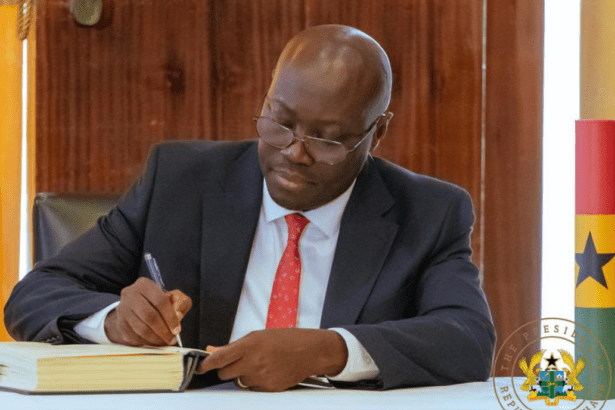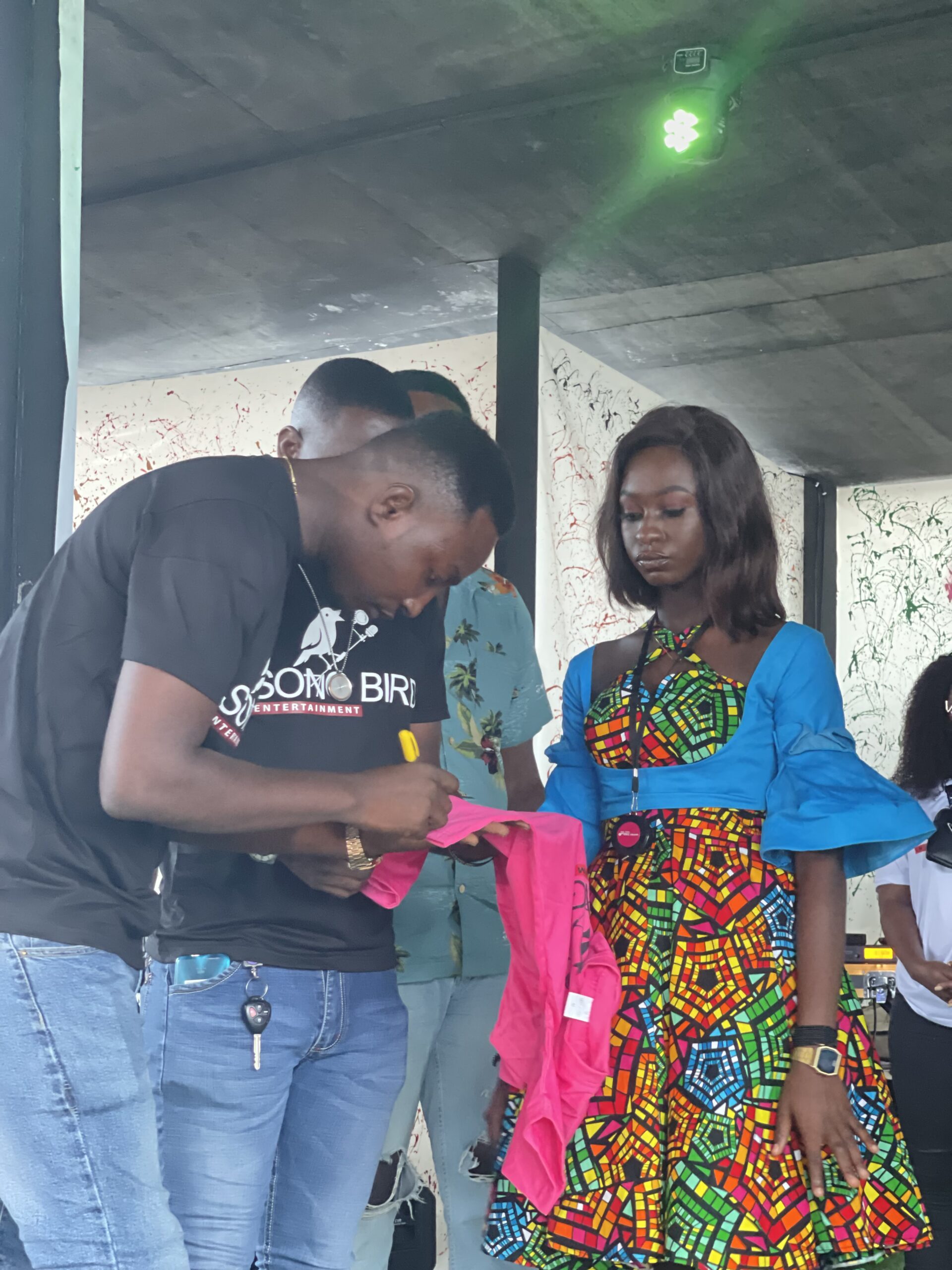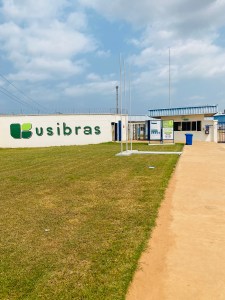Business
Ato Forson elected Chairman of ECOWAS Bank for Investment and Development

The Minister for Finance, Dr. Cassiel Ato Forson, has been elected Chairman of the Board of Governors of the ECOWAS Bank for Investment and Development (EBID).
The announcement was made during the 23rd Annual General Meeting of the Board of Governors, held in Banjul, The Gambia.
Though Dr. Forson could not attend the meeting in person, his message of appreciation and vision was delivered with conviction by Deputy Minister for Finance, Thomas Nyarko Ampem.
Mr Ampem extended warm greetings from the Government and people of Ghana, expressing Dr. Forson’s deep humility and appreciation for the honour bestowed upon him.
He acknowledged the significant responsibility that comes with the role and pledged Ghana’s unwavering dedication and commitment to the mission of EBID.
“To my fellow Governors, thank you for the trust you have placed in Ghana’s leadership. I will continue to rely on your support and collaboration in the year ahead,” Dr Forson posted on Facebook, April 14.
Dr. Forson’s address laid out a strategic vision focused on four key areas of development for EBID:
1. Strengthening Resource Mobilization to more effectively finance regional development initiatives;
2. Improving Capital Recovery by enhancing asset management and operational efficiency;
3. Facilitating Non-Regional Membership to broaden the bank’s investment base and partnerships;
4. Positioning EBID as the premier Development Finance Institution in West Africa and beyond.
“With collaborative effort and renewed purpose, EBID can play a critical role in building a prosperous and integrated West Africa,” he said.
Dr. Forson commended Dr. George Agyekum Donkor, President of EBID, and his team for their remarkable work in advancing the institution’s goals for regional integration and economic development.
Outgoing chairman Hon. Seedy Keita expressed his gratitude for the opportunity to serve as Chair of the Board and extended his full support to Dr. Forson.
He emphasized EBID’s pivotal role in promoting economic development among ECOWAS member states and voiced confidence in the new leadership to propel the Bank to greater heights.
The ECOWAS Bank for Investment and Development (EBID) serves as the development finance institution of the Economic Community of West African States (ECOWAS), encompassing 15 member countries.
Initially established as the ECOWAS Fund in 1975, the institution was transformed into EBID in 1999 and has since evolved into a unified bank serving both public and private sector needs.
With its headquarters in Lomé, Togo, EBID has been a cornerstone of regional integration and sustainable economic growth, especially since restructuring into a single-window institution in 2007. The Bank continues to finance transformative projects across the region.
Ghana remains a key beneficiary and partner of EBID. As of the latest figures, the Bank’s total commitment to Ghana stands at approximately $ 408 million, supporting 24 active projects across sectors such as finance, energy, and infrastructure.
Notable projects include partnerships with Consolidated Bank Ghana, Access Bank Ghana PLC, Tema LNG Terminal, and Marriott Hotel.

Business
SongbirdCEO is the Master BRAIN behind Kwaku Ne Akua Foundation.

Kwaku ne Akua Foundation
The Kwaku ne Akua Foundation is a non-governmental organization (NGO) dedicated to creating positive change through charitable initiatives. We are built on the powerful principle of collective action, fueled by the generous donations and contributions of our dedicated members. Our work is made possible by a vibrant and passionate network of volunteers committed to making a tangible difference in our communities.
To identify and address critical needs within our communities by mobilizing resources and volunteers. We provide support, hope, and opportunity to the vulnerable and underserved through targeted charitable programs and donations.
The Visionary:
The brain behind this beautiful project is Mr. George Lariba Azure, the esteemed CEO of Songbird Entertainment Limited. His vision extends beyond the world of entertainment, driven by a deep-seated passion for social responsibility and a commitment to giving back. Mr. Azure founded the Kwaku ne Akua Foundation to create a structured, sustainable channel for compassion, uniting people for a common, charitable cause.
What We Do:
- Organized Charity Drives:We mobilize our network to collect and distribute essential resources, including food, clothing, educational materials, and medical supplies.
- Member-Funded Support:The foundation operates on the generous financial contributions of its members, ensuring that every donation directly supports our charitable causes.
- Volunteer-Led Initiatives:Our volunteer group is the backbone of our operation, contributing their time, skills, and energy to bring our projects to life.
- Community Partnerships:We collaborate with local communities to identify their most pressing needs and ensure our support is both effective and respectful.

Our Name: “Kwaku ne Akua”
The name, rooted in Ghanaian culture, symbolizes universality and shared humanity. “Kwaku” and “Akua” (common names for children born on Wednesday ) represent every man and woman. It signifies that our foundation is for everyone, by everyone, and that our strength lies in our unity.
Join Us:
We believe that together, we can achieve more. You can be a part of this beautiful project by:
- Becoming a Contributing Member
- Joining our Volunteer Group
- Partnering with Us
For more information on how to get involved, please contact us.
Contact Information:
[Tel;+233266200900 ,Email.songbirdafrica@gmail.com,songbirdghana@gmail.com]
SongbirdCEO is the Master BRAIN behind Kwaku Ne Akua Foundation.
Business
We must consider the strategic rehabilitation and employment of arrested cybercriminals.

 This month, as we officially launch National Cybersecurity Awareness Month, we unite under a common banner: to build a safer, more secure digital Ghana. We’ll hear about strong passwords, two-factor authentication, and the importance of updating our software. These are the essential foundations, the “hygiene” of the digital world.
This month, as we officially launch National Cybersecurity Awareness Month, we unite under a common banner: to build a safer, more secure digital Ghana. We’ll hear about strong passwords, two-factor authentication, and the importance of updating our software. These are the essential foundations, the “hygiene” of the digital world.
But today, let’s talk about something more radical. Let’s talk about the elephant in the server room.
There’s an old saying in security circles: “To catch a thief, you think like a thief.” In the cyber realm, this adage reaches its zenith. The most formidable cybercriminals—the ones our dedicated agencies work tirelessly to apprehend—don’t just think like thieves. They possess a deep, intuitive, and often unparalleled understanding of the digital vulnerabilities they exploit.
When these individuals are arrested, a critical question emerges: What do we do with this concentrated talent? Do we simply lock away their potential, or do we dare to do something transformative?
We must consider the strategic rehabilitation and employment of arrested cybercriminals.
Before you dismiss this as reckless, consider the precedent. In the world of ethical hacking, the most sought-after professionals are often those who can deconstruct a system with the same creativity and ruthlessness as a malicious actor. They know the backdoors because they’ve built them. They understand social engineering because they’ve perfected the art of the manipulative phone call or email.
just awareness, but also innovation. Let’s champion the traditional messages of caution, but let’s also dare to have courageous conversations about how we build an unbreachable digital Ghana.
The minds that have challenged our systems could be the very ones to fortify them. The question is, are we ready to offer a second chance in exchange for a safer future for all?
Let’s use this month to start the conversation.
Join the Dialogue.
What are your thoughts? Can rehabilitation work in our cybersecurity strategy? Share your views using the hashtag #GhanaCyberFuture.
Together, let’s build a Ghana that is not only digitally enabled but also digitally empowered and secure.
Business
Cashew Giant Signals Move to Ivory Coast Amid Industry Crisis
Usibras Ghana Limited, Ghana’s largest cashew processor (35,000 MT/year), invested over $35 million since 2010 and exports mainly to the U.S. Facing rising operational and economic pressures, the company announced on Sept 11–12, 2025 that it may relocate to Côte d’Ivoire. The move could cause job losses, lower farmer incomes, and hurt Ghana’s cashew sector. As of Sept 24, 2025, no final decision has been made, though the government is intervening.

Key Challenges Behind Usibras’ Possible Exit
Usibras cites four main pressures:
- Raw Material Shortages: In 2025 it sourced only 7,000 MT—about 20% of capacity—because raw nuts are often exported unprocessed, while Côte d’Ivoire offers steadier supply.
- High Utility/Operating Costs: Rising electricity and input prices undermine profitability in energy-intensive processing.
- Unfavorable U.S. Tariffs: Ghanaian exports face a 15% U.S. tariff, higher than Côte d’Ivoire’s rates.
- Regulatory/Supply Chain Gaps: Weak local-processing enforcement and limited government support reduce competitiveness.
These factors have already led to downsized operations and staff cuts.
Economic and Social Impacts
The potential relocation could have ripple effects across Ghana’s economy:
- Job Losses: Usibras employs about 700 workers at its Dawhenya facility near Prampram (Greater Accra Region). A full shutdown would displace all staff, hitting local communities hard and inflating unemployment rates.
- Farmer and Supplier Disruptions: Farmer associations lose a major buyer, potentially discouraging cashew production and affecting thousands of smallholder farmers. Service providers (e.g., logistics, packaging) tied to Usibras would also suffer.
- Export and Forex Losses: As a top exporter, Usibras generates substantial foreign exchange. Its exit could weaken Ghana’s cashew industry, which aims to process 50% of its 400,000+ MT annual output domestically by 2030, positioning the country as a West African value-addition hub.
- Investor Confidence: Industry experts warn this could deter future agribusiness investments, signaling systemic failures in Ghana’s cashew sector.
Social media on X (formerly Twitter) amplified these concerns in mid-September 2025, with users like @CediRates (10,000+ views) and @Gen_Buhari_ (12,000+ views) highlighting the $35M investment at risk and youth unemployment implications.

Government Response and Proposed Solutions
The Ghanaian government responded swiftly:
On September 17, 2025, Trade and Industry Minister Elizabeth Ofosu-Adjare met with the Association of Cashew Processors Ghana in Accra, reaffirming support for a “fair and sustainable cashew sector.” She pledged emergency measures, including:
- Policy alignment with Côte d’Ivoire’s incentives (e.g., tax breaks for processors).
- Enforcement of raw nut purchase rules via the Tree Crops Development Authority.
- Formation of a task force to regulate the industry and boost local supply.
The president, Mr. Caramelo Raposo expressed “cautious optimism” post-meeting, noting the company’s decade-long commitment to Ghana but stressing the need for immediate action to retain technical expertise and jobs.
-

 Health3 months ago
Health3 months agoMilitary Need to Step In to Solve Ghana’s Sanitation Crisis.
-

 Entertainment3 months ago
Entertainment3 months agoGeorge and Kat are getting married.
-
Business2 months ago
António Caramelo Raposo: Driving Growth in Ghana’s Cashew Industry
-

 Entertainment3 months ago
Entertainment3 months agoGeorge and Kat memories pictures.
-

 General2 months ago
General2 months agoInfrastructure collapse Ghana:Ghana’s Climate Emergency
-

 Entertainment2 months ago
Entertainment2 months agoGhana Highlife Era is gone for Good.
-

 Uncategorized2 months ago
Uncategorized2 months agoBreaking News | A Nation in Mourning!!😭😭😭
-

 Entertainment2 months ago
Entertainment2 months agoReasons the White Bird known as Cattle Egret Follows the Cow






